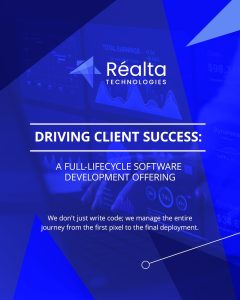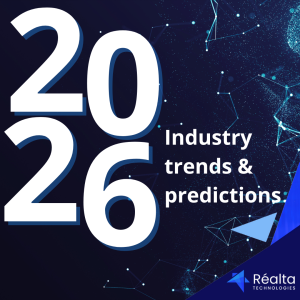What Is Databricks? A Modern Data Platform for Modern Businesses
What Is Databricks? A Modern Data Platform for Modern Businesses
Introduction
Databricks is one of the most powerful and versatile platforms available for handling large-scale data analytics, machine learning, and AI workflows. Built on top of Apache Spark, it enables organisations to unify their data and AI strategies with scalable solutions tailored for speed, collaboration, and security.
As industries like life sciences, pharmaceutical manufacturing, and advanced engineering become increasingly data-rich, the need for a platform like Databricks becomes essential. At Réalta Technologies, we use Databricks to help clients unlock real-time insights, streamline operations, and make smarter, faster decisions.

What Is Databricks?
Databricks is a cloud-based unified analytics platform designed to simplify the process of data engineering, data science, machine learning, and business intelligence. It brings together teams working with data into a single collaborative environment that supports the entire data lifecycle, from ingestion to modelling to visualisation.
It’s often described as a “lakehouse” platform, combining the best features of data lakes (scalability and flexibility) and data warehouses (structured querying and performance) in a single system.
Key Features of Databricks
1. Unified Workspace
Databricks enables data engineers, data scientists, and analysts to work in one collaborative environment. With shared notebooks, version control, and access management, the platform supports streamlined teamwork and knowledge sharing.
2. Delta Lake
Delta Lake is an open-source storage layer that brings ACID transaction capabilities to data lakes. This ensures reliability and consistency of data even as it scales.
3. Machine Learning & AI Integration
Databricks includes pre-built ML environments, AutoML tools, and native integrations with frameworks like TensorFlow, PyTorch, and XGBoost. This accelerates the development and deployment of machine learning models.
4. Optimised Apache Spark Engine
At its core, Databricks runs on Apache Spark, allowing it to process massive datasets quickly and efficiently across multiple nodes.
5. Scalability & Cloud Flexibility
Databricks supports multi-cloud environments and allows elastic scaling of compute resources, making it ideal for businesses with variable data workloads.
What Are the Benefits of Using Databricks?
Faster Time to Insight: Streamlined data pipelines and real-time processing enable teams to go from raw data to actionable insights faster.
Reduced Data Silos: By centralising your data, teams can eliminate fragmentation across departments and tools.
Improved Collaboration: A single platform for engineering, science, and analytics reduces duplication of work and fosters teamwork.
Scalability: Easily scale your workloads without overhauling infrastructure.
Cost Efficiency: With automated workflows and serverless options, Databricks helps reduce resource waste and manage costs effectively.
Security & Governance: Enterprise-grade controls for access, compliance, and data governance make it suitable for highly regulated industries.
Real-World Use Cases
Pharmaceutical Manufacturing
Databricks enables predictive maintenance, process optimisation, and batch analysis by aggregating data from lab systems, MES platforms, and IoT sensors. It supports compliance with regulations like 21 CFR Part 11 through robust audit trails and governance features.
Life Sciences R&D
Scientists and analysts can use Databricks to process large-scale genomic or clinical trial data, identify trends, and model outcomes using AI-driven methods.
Supply Chain Optimisation
With real-time analytics, Databricks helps monitor production rates, material availability, and logistics to support lean manufacturing strategies.
Predictive Quality Control
Machine learning models built in Databricks can detect early warning signs of quality deviations, allowing teams to act before products fall out of spec.
How Réalta Technologies Adds Value with Databricks
At Réalta Technologies, our data engineers and data scientists are experts in deploying Databricks to regulated environments. We work closely with clients in life sciences and manufacturing to:
- Architect and implement secure, scalable Databricks environments.
- Integrate data sources such as AVEVA PI, SCADA systems, MES, and LIMS.
- Develop custom machine learning models for anomaly detection, predictive analytics, and process optimisation.
- Maintain governance and compliance throughout the data lifecycle.
- Train internal teams on best practices to make Databricks a sustainable part of their operations.
Our partnership with Databricks is a testament to the depth of experience our team brings in leveraging modern platforms to solve complex industrial challenges.
Conclusion
Databricks is transforming how industries harness the power of data. With its unified approach to engineering, science, and analytics, it supports innovation, efficiency, and growth at every stage of the data journey.
For organisations in regulated sectors, the ability to derive insights while maintaining control and compliance is essential. Réalta Technologies is proud to partner with clients to deliver intelligent, secure, and scalable solutions using Databricks.
Need help getting started with Databricks or optimising your existing deployment? Contact Réalta Technologies today:
Phone: +353 21 243 9113
Email: [email protected]

Software Development at Réalta Technologies: Building Scalable, Secure and User-Focused Digital Solutions
Réalta Technologies introduces its Software Development service, delivering end-to-end digital solutions designed for regulated and complex environments. From concept to deployment, Réalta builds scalable, secure

The Future of Data Analytics and Industry Trends for 2026 and Beyond
As the data analytics industry continues to evolve, organisations are shifting from basic reporting to real-time insight, AI-driven intelligence and connected data ecosystems. This blog

Réalta Technologies Joins TDengine Partner Network as a Value-Added Reseller
Réalta Technologies, an Ireland-based global automation and digital systems integrator, has joined the TDengine Reseller Program as a value-added reseller (VAR). The partnership expands TDengine’s
What Is Databricks? A Modern Data Platform for Modern Businesses
Introduction
Databricks is one of the most powerful and versatile platforms available for handling large-scale data analytics, machine learning, and AI workflows. Built on top of Apache Spark, it enables organisations to unify their data and AI strategies with scalable solutions tailored for speed, collaboration, and security.
As industries like life sciences, pharmaceutical manufacturing, and advanced engineering become increasingly data-rich, the need for a platform like Databricks becomes essential. At Réalta Technologies, we use Databricks to help clients unlock real-time insights, streamline operations, and make smarter, faster decisions.

What Is Databricks?
Databricks is a cloud-based unified analytics platform designed to simplify the process of data engineering, data science, machine learning, and business intelligence. It brings together teams working with data into a single collaborative environment that supports the entire data lifecycle, from ingestion to modelling to visualisation.
It’s often described as a “lakehouse” platform, combining the best features of data lakes (scalability and flexibility) and data warehouses (structured querying and performance) in a single system.
Key Features of Databricks
1. Unified Workspace
Databricks enables data engineers, data scientists, and analysts to work in one collaborative environment. With shared notebooks, version control, and access management, the platform supports streamlined teamwork and knowledge sharing.
2. Delta Lake
Delta Lake is an open-source storage layer that brings ACID transaction capabilities to data lakes. This ensures reliability and consistency of data even as it scales.
3. Machine Learning & AI Integration
Databricks includes pre-built ML environments, AutoML tools, and native integrations with frameworks like TensorFlow, PyTorch, and XGBoost. This accelerates the development and deployment of machine learning models.
4. Optimised Apache Spark Engine
At its core, Databricks runs on Apache Spark, allowing it to process massive datasets quickly and efficiently across multiple nodes.
5. Scalability & Cloud Flexibility
Databricks supports multi-cloud environments and allows elastic scaling of compute resources, making it ideal for businesses with variable data workloads.
What Are the Benefits of Using Databricks?
Faster Time to Insight: Streamlined data pipelines and real-time processing enable teams to go from raw data to actionable insights faster.
Reduced Data Silos: By centralising your data, teams can eliminate fragmentation across departments and tools.
Improved Collaboration: A single platform for engineering, science, and analytics reduces duplication of work and fosters teamwork.
Scalability: Easily scale your workloads without overhauling infrastructure.
Cost Efficiency: With automated workflows and serverless options, Databricks helps reduce resource waste and manage costs effectively.
Security & Governance: Enterprise-grade controls for access, compliance, and data governance make it suitable for highly regulated industries.
Real-World Use Cases
Pharmaceutical Manufacturing
Databricks enables predictive maintenance, process optimisation, and batch analysis by aggregating data from lab systems, MES platforms, and IoT sensors. It supports compliance with regulations like 21 CFR Part 11 through robust audit trails and governance features.
Life Sciences R&D
Scientists and analysts can use Databricks to process large-scale genomic or clinical trial data, identify trends, and model outcomes using AI-driven methods.
Supply Chain Optimisation
With real-time analytics, Databricks helps monitor production rates, material availability, and logistics to support lean manufacturing strategies.
Predictive Quality Control
Machine learning models built in Databricks can detect early warning signs of quality deviations, allowing teams to act before products fall out of spec.
How Réalta Technologies Adds Value with Databricks
At Réalta Technologies, our data engineers and data scientists are experts in deploying Databricks to regulated environments. We work closely with clients in life sciences and manufacturing to:
- Architect and implement secure, scalable Databricks environments.
- Integrate data sources such as AVEVA PI, SCADA systems, MES, and LIMS.
- Develop custom machine learning models for anomaly detection, predictive analytics, and process optimisation.
- Maintain governance and compliance throughout the data lifecycle.
- Train internal teams on best practices to make Databricks a sustainable part of their operations.
Our partnership with Databricks is a testament to the depth of experience our team brings in leveraging modern platforms to solve complex industrial challenges.
Conclusion
Databricks is transforming how industries harness the power of data. With its unified approach to engineering, science, and analytics, it supports innovation, efficiency, and growth at every stage of the data journey.
For organisations in regulated sectors, the ability to derive insights while maintaining control and compliance is essential. Réalta Technologies is proud to partner with clients to deliver intelligent, secure, and scalable solutions using Databricks.
Need help getting started with Databricks or optimising your existing deployment? Contact Réalta Technologies today:
Phone: +353 21 243 9113
Email: [email protected]

Software Development at Réalta Technologies: Building Scalable, Secure and User-Focused Digital Solutions
Réalta Technologies introduces its Software Development service, delivering end-to-end digital solutions designed for regulated and complex environments. From concept to deployment, Réalta builds scalable, secure

The Future of Data Analytics and Industry Trends for 2026 and Beyond
As the data analytics industry continues to evolve, organisations are shifting from basic reporting to real-time insight, AI-driven intelligence and connected data ecosystems. This blog

Réalta Technologies Joins TDengine Partner Network as a Value-Added Reseller
Réalta Technologies, an Ireland-based global automation and digital systems integrator, has joined the TDengine Reseller Program as a value-added reseller (VAR). The partnership expands TDengine’s
What Is Databricks? A Modern Data Platform for Modern Businesses Read More »
